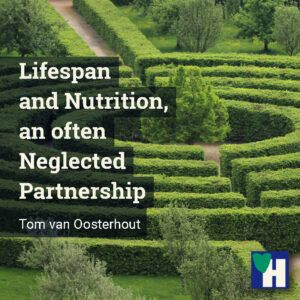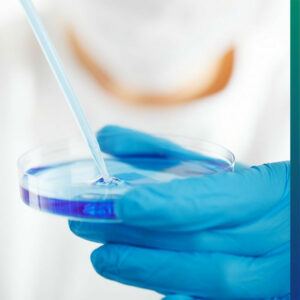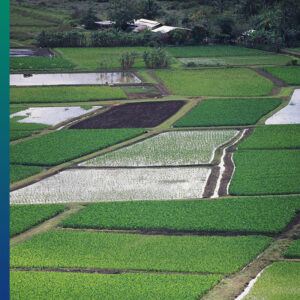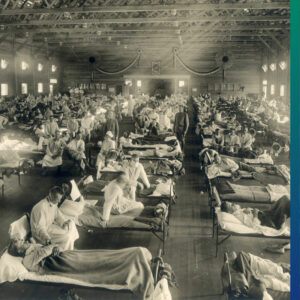
Lifespan and nutrition are an often neglected partnership. This partnership had a huge impact on the way we live today. Why do we consistently neglect the impact of this partnership? This needs some serious discussion.
In the eighties of the last century, as a communication expert, I designed a circular policy decision-making model. I used this model to explain to civil servants and politicians how their decisions transformed into the actions that were supposed to materialize their intended goals. The goals were always aimed at changing citizens’ behavior.
The model was also very helpful in explaining what could go wrong, every step of the way. The model was designed to help to prevent this. I taught them to design their decision-making process by rethinking every step involved, starting from the end of the process, the materialization of their intended goals, and then circling all the way back to their decisions.
During the discussions using the model, I always asked my audience what the flaws were of the model. After all, rarely do political decisions materialize as intended. One of the most intriguing flaws they came up with is that many political problems never reach the decision stage.
Related to: The Quality of Food Determines Life Expectancy
Some of the links are affiliate links. As an affiliate associate, we earn a commission when you purchase any of the products offered through the shared links at no extra cost for you. This helps us maintain this website.
Table of contents
Our limited span of control

I remembered this flaw because I noticed that The Independent Panel for Pandemic Preparedness & Response, in its May 2021 report ‘COVID-19: Make it the Last Pandemic’, suggests at least 40 recommendations. The huge number of recommendations was a surprise. I do not envy those that will get the task to turn these into political decisions.
However, what surprised me most was that the recommendations are not based on an analysis of the problem: what is COVID-19, what causes it, and is it a pandemic? How many failures do we have to make, before we understand how utterly limited our span of control is? What does this mean?
The Panel-report explains that 150 million people worldwide were infected with the SARS-CoV-2-virus. 3 million people (2% of the 150 million) are assumed to have died of COVID-19, the specific disease caused by this virus. The report does not explain why the other more than 7 billion people were not infected and another 140 million people (2% of these 7 billion) did not die.
Moreover, why did only 3 million people die of the 150 million infected, and not all of them? What was wrong with them? Why did those 7 billion not get infected and why did those 140 million people not die? I thought this would be of some concern and be part of any serious evaluation effort. Not a word’s notice!
Domestication, urbanization, and industrialization

The history of humankind has a long line of these types of crucial failures. Domestication, urbanization, and finally industrialization; just to name a few. These failures produced the huge problems we face today.
These are failures because we can only stay alive in our failed environments using an enormous amount of poisonous chemicals and other unfavorable auxiliary devices, such as the combustion engine.
We call this modern life, a type of life producing many risks: polluted air, water, and soil, and annihilated biodiversity and ecosystems. All essential provisions we depend on. Perhaps these risks are the price we pay for our longevity and good health.
Roughly, from halfway through the 19th century until now our lifespan doubled. Unfortunately, many people attribute our current good health and longevity to modern medical insights. Although there is some truth in this, it is not even half the truth. Let me explain this with two examples from two different perspectives: tuberculosis and penicillin.
Tuberculosis

In England and Wales in 1838, 4,000 in 1 million people died of tuberculosis each year. That number dropped to about 2,000 in 1882. This is the year Robert Koch discovered the tuberculosis bacillus. This number fell even further to 350 deaths in 1945.
In 1945 the drugs streptomycin and PAS came onto the market to treat tuberculosis. By 1960 the number of tuberculosis deaths had fallen to almost zero. However, tuberculosis did not disappear due to a vaccine. Until this very day, there does not exist an effective vaccine against the tuberculosis bacillus. Streptomycin and PAS are what I call, ‘end-of-the-pipeline’ tools. They repair the damage done.
Tuberculosis disappeared because those who suffered from tuberculosis were forcibly placed in sanatoriums. To prevent them from infecting healthy people they were separated from them. A fact that had already been shared in 1908 in the book The Prevention of Tuberculosis.
Penicillin
Our limited span of control, when it comes to our longevity and modern medical insights, can also be explained from the perspective of a medical tool, which repairs damage done: penicillin.
In 1964 someone finally unraveled why the microbiologist Fleming discovered penicillin in 1928. This unraveling starts with the observation that there are myriads of chance developments explaining why other scientists could not replicate Fleming’s discovery.
The particular strain of penicillin, contaminating Fleming’s petri dish and so inciting his discovery, was blown through the window from a laboratory below his. Fleming went on a 14-day holiday, and against all odds, university rules, and his own habit, he left his petri dish with a bacterial compound uncovered on a table in his laboratory.
Next, during his absence, the strain of penicillin, which was blown in his petri dish from the laboratory below, could grow to kill the bacterial compound because of 9 consecutive days of cool weather.
Fleming himself was not interested in further research. He thought that the penicillin he had discovered was too toxic for therapeutic use. Ten years after 1928, others did pick up his discovery, and the Second World War boosted serious scientific research and the production of penicillin on a large scale. From 1944 and onward, it saved many soldiers’ and citizens’ lives.
Primitive

However, vaccines and antibiotics do make sense! When I was young, a couple of times I got a so-called DKTP-injection. DKTP stands for diphtheria, whooping cough, tetanus, and poliomyelitis. In non-industrialized developing countries these diseases still produce many thousands of victims.
In these countries, mainly the very young children are the most vulnerable, once they get infected, many of them die. When a child in these countries is able to circumvent these risks, the chances of getting old in good health are substantial. Their longevity has some interesting advantages, compared to the longevity in industrialized countries.
First of all, in non-industrialized countries, many people live in small farming communities. Because they farm, they have a lot of exercise. Moreover, they don’t smoke, drink alcohol, or use drugs, or only in very limited amounts. They’re not fat from fast foods either. Living conditions and life are primitive. Cholesterol and sugar levels are low. Heart and artery failures are non-existent. So how did we take the wrong exit?
Circle of doom
As a matter of fact, the remedies we invented, to curb some of the most lethal threats to humans (such as the DKTP-infectious diseases), coincide with some of the biggest risks we created: polluted air, water, and soil, and the destruction of biodiversity and ecosystems.
This probably happened because these two seemingly separate developments were both enabled by domestication, urbanization, and industrialization. As a result, more and more highly complex collaboration, socialization, and institutionalization were required to control the growing amounts of humans in their cramped living conditions.
In a combined effort, citizens, citizen initiatives, companies, and governments, produced education, social welfare, and public medical care systems, providing humans with improved living conditions. And our longevity? What did all these combined efforts contribute to our lifespan?
Related to: Citizens Devoted to the Conservation of Biodiversity
Lifespan and nutrition

I always believed that the increase in our lifespan was the result of clean water, better hygiene, and our medical regimes. With the arrival of barrels, and later the sewerage system, in particular younger children, less and less died of all kinds of terrible infectious diseases. Medical innovations added the extra safety nets. At least, that is how I thought our lifespan rose.
The related developments of lifespan and nutrition in The Netherlands are an excellent example to prove why I was wrong. There, in 1870 suddenly – almost overnight – the lifespan steadily started to rise. Without exception, regardless of age, gender, income, power, and possession the average lifespan increased.
What had happened? It was quite simple: food prices decreased substantially. This was caused by the mechanization of agriculture in the United States. More crops could be grown and harvested in less time and with less manual labor. As a consequence of the many deaths caused by the American Civil War (1861-1865), there were also fewer farm workers available and there was less demand on the home market. Agricultural prices in the US dropped.
The cheap US-cereals flooded the, apparently competitive, European market. With the same income, people could buy more food. More food and a better and more varied diet improved the physical condition and made people more resistant to diseases and disorders. Moreover, this enabled them to work harder and earn more money, which increased their living standards, and their lifespan, which rose in a steady flow.
Our quality of life
Over time, I learned how our lifespan and nutrition actually relate, and how relative hygienic and medical progress is. The increase of our lifespan can be classified roughly as follows (with the estimated percentage of contribution per cause in parentheses):
- 1870-1900: fundamental shift in the food situation (75%);
- 1900-1940: improvement of hygiene (10%);
- 1945-1970: medical progress (15%).
Although it is reassuring, that as long as we can maintain our food supply at par with the population growth, the impact of food and food production is often ignored, misunderstood, or misrepresented. The growing body size of modern humans is only one indication that we neglect the importance of food. Is there not a relation between being overweight and the risk of dying from COVID-19 as well?
The negative impact of our food habits and food production on the quality of air, water, and soil, and biodiversity, and the ecosystems we depend upon, are also often ignored, misunderstood, or misrepresented. It’s about time we stop neglecting the link between our lifespan and nutrition, and the way we organize this partnership.
How do you want to grow old? Please write your wishes in the comment box below.



Hi Tom, this is a great article about lifespan and nutrition. Very often, we live our busy lives not paying enough attention to our nutrition. When we start paying attention to what we put into our bodies is usually when something goes wrong, but then it might be too late.
Your article is pointing out some harsh truths. They are not easy to think about but if we do not do something about them, our future looks very gloom. Thank you for reminding us that now is the time to start thinking about the hard truths and start doing something about it.
Hi Anna,
Thank you for your comment and compliments.
The interesting thing about the truth is that it is not hard. The truth is soft. Many people deny the truth, so it must be very soft. Moreover, what is the truth but an insignificant moment in time?
Humans are hard. They get very tough when serious changes are required. They exercise every excuse not to. Or they stick their heads in the sand as ostriches do.
Humans are hard. They avoid any confrontation with the consequences of their behavior. They systematically transfer all responsibility for what they see as bad to others and the government.
Humans are hard. They get very aggressive when asked why they behave as they behave. They deny others to express different opinions or exercise different behaviors.
That is what I call hard. And this human callousness is not an insignificant behavior, at an insignificant moment in time.
Still, for now, stay safe, stay healthy.
Regards,
Tom
Even Hyppocrates said “let food be thy medicine and medicine be thy food” . The Ancient Greeks already knew it, but we still haven’t learned. Humans may be the smartest animals on Earth but we are in fact the dumbest (while still being arrogant about our intellectual “superiority”) because we do not use our brains for our and the world’s benefit. We use our brains to destroy other nations, our ecosystems, pollute the planet, raze rainforests to the ground, commit daily genocides on animals for food, create more crappy and unhealthy food, and then invent more medicine to cure diseases that are caused by our crappy food.
We are the only animals on this planet that suffer so many diseases, diseases which we have brought upon ourselves. No other animals get cancer, diabetes, obesity, asthma, and what-have-you because they live as nature intended, in harmony with their surroundings, eating food that is meant for their bodies. The only animals that get our diseases are dogs and cats, because we feed them our processed foods. Dogs get cancer, tumors, etc. There’s obviously a link here. The pet veterinary and pharmaceutical industry is also an expensive one …
I am not surprised that politicians cannot make a decision regarding solutions to covid. They are good at talking and arguing, but during their arguments they always throw obstacles at each other, focusing on their political beliefs instead of the common good. I think that the best way to take care of ourselves and our immediate surroundings is to do it ourselves and stop relying on politicians who do not have our best interests at heart.
Hi Christine,
Thank you for your sharp-witted comment. I totally agree. Hypocrisy (hmmm, sounds a bit like Hippocrates) and narcissism (being constantly in love with yourself) rule the world.
Although I must be cautious blaming others to be hypocrites or narcissists. When I reflect on the articles I write, sometimes I think I’m also acting too much out of a kind of intellectual superiority. No matter how often I tell myself, I’m not. I often present my arguments as the only correct ones.
Take Hannie, she is far more intelligent than I am. All my life I worked and lived with people who are intellectually superior to me and far more experienced.
Perhaps this is the best way to put my intelligence in perspective: I try to argue from my experiences, and I share my arguments openly with others. This offers others the opportunity to approve or disapprove. I like to debate. Because others help you to understand your own feelings and opinions.
Take for example pets. I don’t like pets. None. Animals should be free, not on a leash. It’s the same with trees and all others plants. They all should be free and respected.
You’re right, we should take care of ourselves. But who is the ‘we’, and what does this ‘we’ want? You should be surprised how many people agree with politicians. I’m afraid many politicians have a keen eye for the ‘common good.’ This is, however, not your and my common good.
I’m also afraid we’re still a minority. Sometimes that’s nice. We share similar opinions and debate these. From the perspective of the changes we advocate, this is problematic.
I’m afraid that to get people’s heads out of the sand and to open their eyes, takes a day job, and not from nine to five. Recently I suggested some like-minded friends, we start a ‘thinking collective’ to exchange opinions and debunk ‘lies, spies, and deceptions’. Who knows.
For now, stay safe, stay healthy.
Regards,
Tom
For me balance is key and I learned this after years of following the latest fad diets. I eat clean and healthy 95% of the time with the rest being occasional treats, takeout, lightly fried foods etc.
After years of having a balanced nutrition along with those 8 hours of sleep I no longer feel the need to start my day with something sweet or to snack like it’s my job. I listen to my body and focus more on colorful meals and it shows.
Hi Sandra,
Yes, it takes quite an effort to balance your food. Patience and energy, that’s what you need. Actually, it’s as if you are balancing your whole life.
But the rewards are gratifying. It’s as you explain, life gets more relaxed. You feel more at ease with your body.
Perhaps you also experience, like we do, that it is less difficult to arrange your everyday activities. You know what you want and you know what to do to get it.
There is a lot of satisfaction in this.
Thank you for your comment.
Stay safe, stay healthy.
Regards,
Tom
Hi Tom, This is my favorite topic! You have written a great article about nutrition and lifespan. I studied many interesting people who have influenced my thinking very much, Hildegard von Bingen, Pfarrer Kneip are some of them.
The way people lived in the 19th and 20th centuries has certainly changed by now. Penicillin was such a blessing, but nowadays, they feed the animals with antibiotics while treating and feeding them wrong. We automatically receive antibiotics before an operation. The resistance we develop because of these habits will be responsible that more people don’t react well to many antibiotics anymore. I know people who have received antibiotics for more than a half year which destroys their whole microbiome.
I also believe that the decreased prices and the oversupply of food suddenly have created more welfare and health. But the destruction of our soils nowadays has created such a deficiency in nutrients that most people can’t be healthy. In addition, the toxins we inhale and consume are burdening our bodies and environment. A real problem, what they now will try to resolve with the great reset…
Hi Sylvia,
It’s always nice when the topics we choose are appreciated by others. Thanks also for your compliments.
Our life support has become an industry. Whether it’s the food we eat or the medicines we need, it’s all processed. Often upsetting age-old favorable traditions.
Sometimes I wonder what’s left to control ourselves. ‘The great reset’ is also controlled by others. And it certainly is not ‘the great resetters’ intention to invest more in decentralizing control; to put more responsibility back in our hands. On the contrary.
Of course, I’m well aware of the risks of such decentralization. The more so because we’ve collectively messed up many of the things we now regret. To put back responsibility in our hands is asking for new, other and more problems. However, I don’t see any other way. The world is ruled by people’s heads, stomachs, and predominantly by their wallets, and this is not going to change overnight.
Fortunately, there are still many things we can appreciate. The last few days our grandchildren stayed here they and we very much enjoy each others company. The youngest, he is 5, reads to me every evening from his favorite book. By now I know the story almost by heart, but every time it’s great fun to listen to him.
Thank you for your comment.
Regards,
Tom